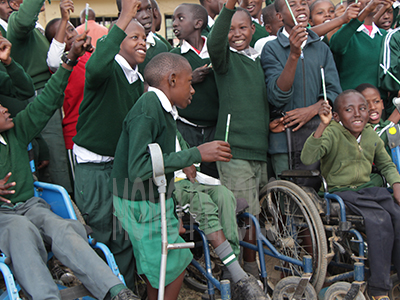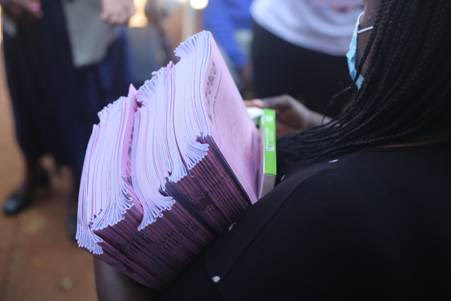28 Oct Poverty and Education in Africa
The United Nations’ fourth sustainable development goal states “Ensure inclusive and equitable quality education and promote lifelong learning opportunities for all”
This statement is yet to materialize fully in many nations of sub-Saharan Africa because of chronic widespread poverty and unequal resource distribution in the continent. The impact of poverty on education in Africa remains one of its biggest challenges. This combined with unending societal issues such as limited or lack of employment opportunities for school and university graduates.
Despite progress over the last two decades, 67 million children worldwide, of whom approximately 53% are girls, do not have access to basic education currently. Barriers to education are also particularly prevalent for children from minority ethnic groups, children with disabilities, and those living in conflict areas.

Pupils of St Mary’s Tala holding tree seedlings
UNICEF identifies 13 significant barriers to education in developing countries:
- Direct costs for examples fees, clothing and books
- Indirect costs (e.g. opportunity cost of attending school)
- Local attitudes and/or traditional practices
- Health and nutrition
- Crisis and instability
- Distance to school
- Poor quality environment (e.g. infrastructure, overcrowding, sanitation, violence)
- Poor quality content (e.g. outdated curriculum, inadequate materials)
- Poor quality processes (e.g. untrained teachers, poor school management)
- National legal framework (e.g. lack of compulsory education requirement)
- Poor legal enforcement of education policies
- Lack of national budgetary allocation to education
- School isolation from the national education system
Africa’s current primary school enrolment rate is above 80% on average meaning that more children in Africa are going to school now than ever before. Yet despite the successes in primary school enrolment, inequalities and inefficiencies remain in this critical sector.
According to the African Union (AU), despite the recent increase in enrolments, there are still glaring dysfunctionalities and inefficiencies in the education sector. Most of Africa’s education and training programs suffer from low-quality teaching and learning, as well as inequalities and exclusion at all levels. Even with a substantial increase in the number of children with access to basic education, a large number still remain out of school due to the unequal distribution of essential facilities, such as schools, as one the drivers of wide income disparities.
It is an established fact that poverty is both a cause and an outcome of low educational enrolments. Breaking the cycle requires great effort including: (a) a targeted attack on poverty through policies that promote sustainable and equitable development; and (b) an unwavering long-term investment in basic education (Psacharopoulos 1995).
The importance of education in developing countries cannot be overstated. Education can be the catalyst needed to pull families and communities out of the cycle of poverty. Knowledge gives children the power to dream of a better future and the confidence needed to pursue a full education, which in turn will help generations to come.
Education also makes a significant difference for adults, particularly when it applies to day-to-day life, including nutrition, healthcare and gender equity. When adults learn, they become role models to their children, who also wish to learn.

Nairobi Football Sevens Series – NF7’s representative distributing exercise books and Momo Pencils to pupils
It is necessary that governments invest heavily in child and youth development through appropriate education and health policies and programmes. Education and particularly Higher-quality education improves the distribution of skilled workers and governments can use this increased supply to build a society in which all people have equal opportunities.
The drivers of inequality in education are many and complex, yet the response to these challenges revolves around sound policies for inclusive growth, the eradication of poverty and exclusion, increased investment in education and human development, and good governance to ensure a fairer distribution of assets.
Education is often referred to as the great equalizer: It can open the door to jobs, resources, and skills that a family needs to not just survive, but thrive.



No Comments